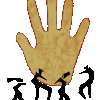Search the Community
Showing results for tags 'wu xing'.
Found 3 results
-

Understanding lesser and greater yin/yang and their relationships
asbc_tao posted a topic in Daoist Discussion
Hi all, I'm trying to understand the relationship between the lesser yin/yang and the greater yin/yang in the Wu Xing system. I know that the elements are arranged along the continuum like this: Greater yin - Lesser yin - Neutral - Lesser yang - Greater yang Water - Metal - Earth - Wood - Fire I know there is something significant about the pairs Metal-Wood and Water-Fire. I'm trying to understand this better and any help would be appreciated. I know that the Kan-Li meditation focuses on exchanging the places of Water and Fire to reach their unity. And also that Metal and Wood house the spirits of Po and Hun respectively, which are the two aspects of the soul. Whereas the heart and kidneys house the Shen and Zhi. If Hun and Po combine to form the complete soul, what does the combination of Shen and Zhi generate? Is this perhaps the spirit? If so, what is the relationship between soul and spirit? One thing that confuses me is that the animal symbols for Kan-Li (Fire-Water) meditation are actually those for the Wood and Metal elements - the green dragon and white tiger. So it looks like both the lesser and the greater yin/yang pairs are involved in Kan-Li steaming. Would somebody explain what their relationship is? I found this quote from Michael Winn on the transformation that happens during the Kan-Li (lesser enlightenment): "The Five vital organ spirits of heart-mind (xin) transmute into the Three primal soul forces (ling). These Three forces – Primal Water, Primal Fire, and Primal Earth – produce the Golden Elixir, the divine seed-egg, our Immortal Embryo, that will mature into our Inner Sage." (http://healingtaoretreats.com/retreat-listings/2017-3b-inner-sexual-alchemy-lesser-kan-li-michael-winn/) Here's how I'm reading the quote: As the lesser yin/yang of Po and Hun (Metal and Wood) combine the five spirits are reduced to three primal forces (ling). At this point the combination shifts to the greater yin/yang of Li and Kan (Water and Fire), leading to the Golden Elixir and eventually the Inner Sage. Does this make sense to others? In part I'm asking to understand my own emotional experience. A few years ago I went through intense periods of anger and grief, which I know are the imbalanced emotions of Hun and Po. After working through them, I began to see more clearly my attachments and fears (the emotions corresponding to the heart and kidneys - Shen and Zhi). Somehow these had been obscure before, and I wonder if this isn't because I was at the stage of the lesser Kan-Li enlightenment, where Hun and Po are at issue. Any input would be very helpful. Thanks.- 5 replies
-
- 4
-

-

-
- wu xing
- kan-li enlightenment
-
(and 1 more)
Tagged with:
-
Hello Dao bums, I have a back to basics moment and I'm pondering the wu xing. I'm looking for perspectives on how you look at / explain the relationship of metal and water in the sheng cycle. For every other element pair the generative aspect is very clear, but this has always seemed a bit opaque to me, so I'm wondering if there's something that I've missed. Any ideas?
- 30 replies
-
- 3
-

-
- Wu xing
- five elements
-
(and 1 more)
Tagged with:
-
A lot of people who follow spiritual paths are very suppressive of their "negative" emotions, hoping to "extinguish" them. I'd like to talk a bit about this, especially regarding the total suppression of anger. Much of post-Qin era Taoism showed influence from The Doctrine of the Mean, which speaks of having balanced levels of both positive and "negative" emotions. Chuang Tzu also reflected someone who did not suppress their emotions, but lived in balance and harmony with them. His influence appeared to show in some Zen "attitudes" as well. Please see the following quote from The Doctrine of the Mean, by Zisi (Confucius' grandson): "While there are no stirrings of pleasure, anger, sorrow, or joy, the mind may be said to be in the state of Equilibrium. When those feelings have been stirred, and they act in their due degree, there ensues what may be called the state of Harmony. This Equilibrium is the great root from which grow all the human actings in the world, and this Harmony is the universal path which they all should pursue. Let the states of equilibrium and harmony exist in perfection, and a happy order will prevail throughout heaven and earth, and all things will be nourished and flourish." So, even though Confucian influence is often considered to be the source of cold, passionlessness in demeanor, Confucius' grandson, Zisi, knew that the emotions of pleasure, anger, sorrow, and joy, were to be allowed to sprout "in their due degree." Someone recently posted about being diagnosed with weak liver qi, being in a job they feel stuck in and afraid to leave, and feeling depression about the whole thing. I noticed that the poster also said they felt better after some kung fu classes, but wasn't comfortable with the aggressiveness of it. He also dealt a lot with his frustration. Now in a case like this, some would ask: "should anger be suppressed in order to avoid further liver qi issues?" Anger is an emotion of the liver. Look at it this way: Liver is wood energy. Wood rises. When you're trying to rise and something gets in your way, what emotion tries to fight it? Anger. Extreme anger just burns out the liver, like putting fire to the wood. But anger, in balance, is useful. It's a function, if you will. If you overly suppress "negative" emotions, they will also become problems which manifest physically. Sometimes a chi kung healer will even need to release the suppressed emotions using various possible techniques. This may include the healer manifesting the emotion themselves in order to help the client's release of it (see Sat Chuen Hon's "Taoist QiGong for Health and Vitality"). So, if you face a situation which requires a bit of constructive anger, but suppress the anger, what happens? how do you deal with it? Most often, people deal with it by wateriness, fear, avoiding, trying to find a way around it no matter how much they have to adjust themselves. Adaptability can be a positive attribute of courage, but when it's based in fear, it taxes the kidneys which leads to more fear. When the liver energy is strong, it draws water energy from the kidneys in balanced amounts which keeps the water energy from being stagnant (the worst way for water to be is stagnant). This way, the kidneys' energy provides courage, and nourishes the liver which can provide the upward force needed to push through the weeds and branches and get to the sunlight! (ie., finally changing a situation) So, just remember if you ever feel that being a "shrinking violet" is part of the spiritual path, that you may be doing you, and your path, a lot more harm than good. (note: this may contradict your structured program of spiritual development. If this is the case, I do not mean to suggest that you should abandon the techniques prescribed by it). Any comments or criticisms on the above article are welcome.
- 1 reply
-
- 3
-

-
- Doctrine of the Mean
- 5 elements
-
(and 1 more)
Tagged with:


